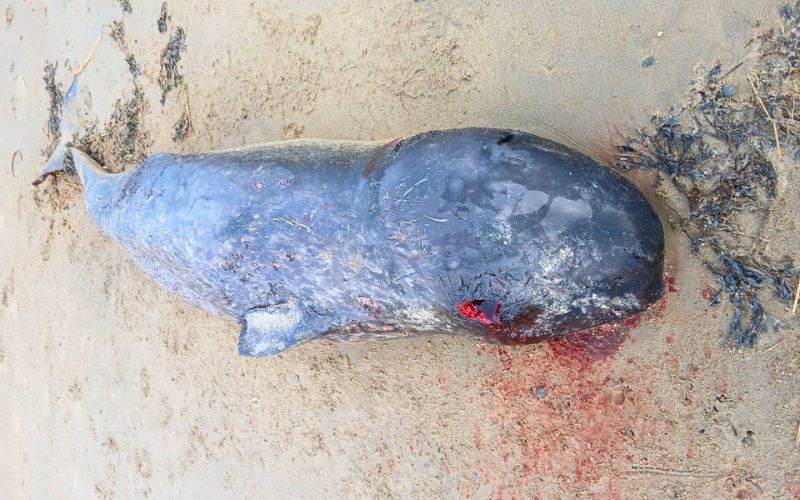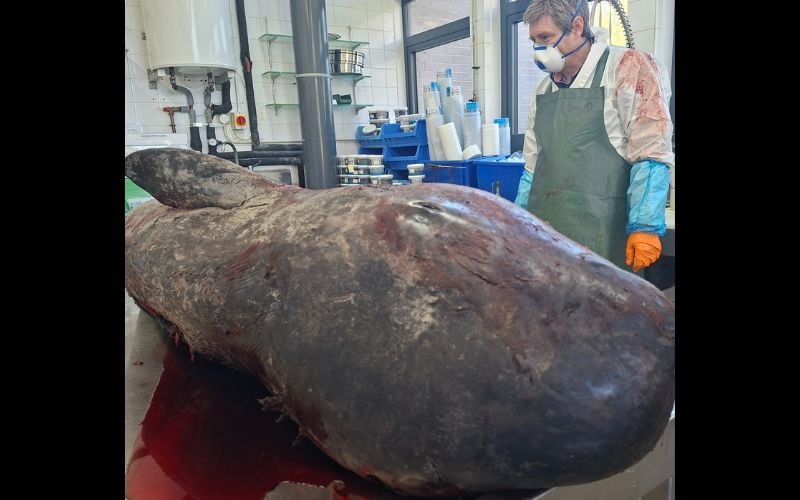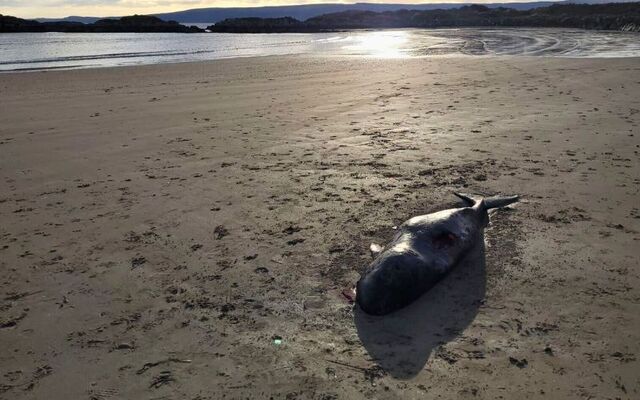The carcass of a female narwhal, an arctic species of whale, was discovered by a family on a Co Donegal beach last weekend, officials confirmed on Friday, November 21.
This is the first time that the narwhal species - a toothed whale found exclusively in the Arctic waters of the North Atlantic - has been recorded in Ireland.
It is also the tenth stranding record of a narwhal in western Europe, and only the fourth female.
The initial discovery was made by Caoimhe, Cara, Aodhán, and Saoirse, who were walking with their parents on Sweet Nellies Beach, just north of Greencastle on the Inishowen Peninsula in Co Donegal.

Narwhal on Sweet Nellies Beach, Greencastle, Co Donegal.(James Milliken and Alena Kunkel / IWDG)
Irish Whale and Dolphin Group (IWDG) Stranding Officer Stephanie Levesque said that after receiving the report, she asked Alena Kunkel, an IWDG local group volunteer, to go and check it out.
"I couldn’t believe it when I saw the photographs," Levesque recalled.
"After consulting some books, the only thing it could be was a narwhal, but I knew they had never been washed up, or seen in Ireland before.
"I knew the importance of recovering this whale and reached out to our stranding network to see who was available.
"Through a combination of checking it was still there the following morning, helping the NPWS [National Parks & Wildlife Service] to transport it to their jeep, and collecting a skin sample in case it was washed out, we were very successful.”
On Sunday morning, NPWS Regional staff found and recovered the animal, where the remains were transported to the Regional Veterinary Lab in Cork.
A team including IWDG's Simon Berrow, Mags Daly, and Stephanie Levesque, and NPWS Marine mammal ecologist Loraine Fay, examined the carcass, led by Cork RVL veterinarian pathologist Jim O’Donovan.
The team confirmed it as a narwhal – the first record for Ireland.
It was a young female, measuring 2.42m in length and in quite poor condition. It was very fresh and could have live stranded.

Narwhal in Cork RVL with Jim O’Donovan preparing to conduct a post-mortem examination. (Simon Berrow / IWDG)
The narwhal was examined as part of the IWDG Deep Diving and Rare Investigation Programme (DDRIP) scheme, funded by the NPWS, where resources are available to react to strandings of rare or deep-diving species for which little is known about their biology in Irish waters.
Results from the post-mortem examination and interesting life-history data will be shared once available, the IWDG said on Friday.
The skeleton of the narwhal has been kept by the IWDG to prepare it for the National Museum of Ireland (Natural History).
Christopher O’Sullivan TD, Ireland's Minister for Nature, Heritage and Biodiversity, thanked everyone who was involved in retrieving the stranded narwhal.
“This is a significant event, and it is important that we try to find out more about why this species arrived on our coastline," O'Sullivan said.
"An examination is underway, which I hope will reveal important details about its life and history, and shed some light on the reasons why it arrived on our shores.
"The narwhal is an arctic species that is mainly found in cooler waters. Findings like this are a stark reminder of the vulnerability of wildlife in the face of a changing climate, and the need to protect them.”
Dr. Simon Berrow, CEO of the IWDG, said the stranding is "remarkable."
"As our waters warm, we have seen a northern movement of whales and dolphins in Irish waters as fish move north seeking cooler waters," he said.
"To have an Arctic species stranded for the first time is somewhat unexpected.
"However we recorded another Arctic species, a bowhead whale, in Ireland for the first time in 2016, so maybe this reflects a breaking down or Arctic ecosystems as the ice melts.
"Clearly, one stranding cannot display any trends, but it does show the importance of our long term monitoring schemes and the power of citizen scientists sending these reports to the IWDG.”
Niall Ó Donnchú, Director General of the NPWS, described the discovery as an "extraordinary and unprecedented event."
He said: “As we await the results, NPWS will continue to work closely with our partners to monitor Ireland’s marine environment and to better understand the impacts of climate and ecological change on vulnerable species. Each event like this reminds us of the importance of sustained scientific vigilance and public awareness in protecting our natural world.”
What are narwhals?
Narwhals are small whales measuring up to 4.6m in length and 1700kg, but males are famous for their long tusks, earning them the nickname 'the unicorns of the sea.'
The stranded narwhal discovered in Co Donegal was a female and had no tusk.
The word “narwhal” comes from the Old Norse nárhval, meaning ‘corpse-whale’, which possibly refers to the animal’s grey, mottled skin and its habit of remaining motionless when at the water’s surface.
Narwhals have been hunted for thousands of years by Inuit in northern Canada and Greenland for meat and ivory, and regulated subsistence hunting continues to this day.
There are an estimated 170,000 living narwhals worldwide. The narwhal population is threatened by the effects of climate change, such as reduction in ice cover and human activities such as pollution and hunting.
Narwhals are rarely recorded outside the Arctic, with the last stranding record in western Europe, when a young male washed up dead in Belgium in 2016. Prior to that record, two females stranded in the Thames Estuary, England, in Kent in 1949. The only sightings are of two off Orkney and one off Aberdeenshire in Scotland in 1882, and one in the Hebrides in 1976.




Comments